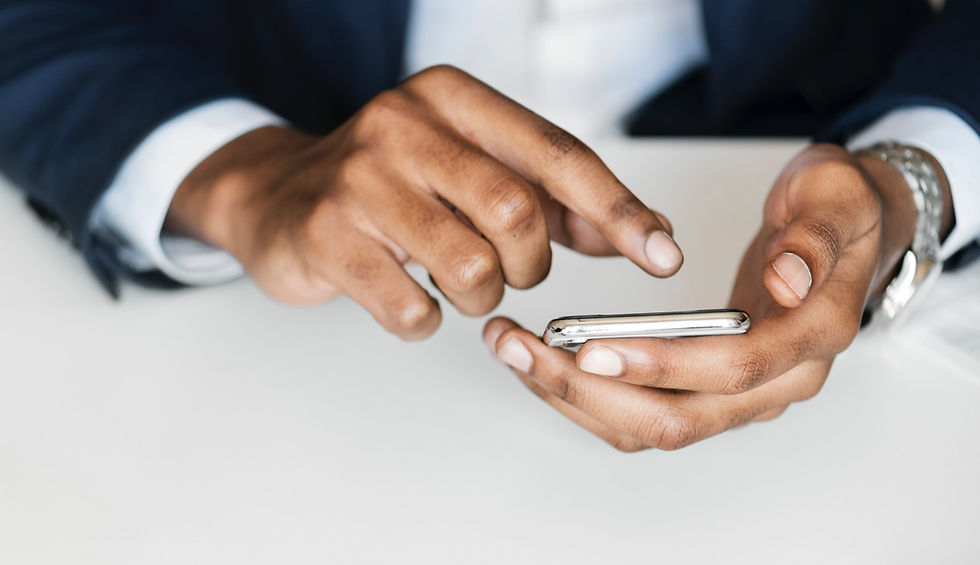Should the Phone Company become a Bank?
- Drew Sullivan
- Jul 12, 2021
- 3 min read

Dealing with a utility like the phone company is viewed by many to be as much fun as visiting the DMV. However since the introduction of the cell phone, Telcos have become central to our everyday lives. According to Statista, 62.o7% of the world population have a mobile phone. And in developed countries like the UK, smart phone penetration has reached 82.9%. If you can take a moment to look up from YOUR device, you will notice most people around you are glued to their screen. Whether that is a good thing for society, is another discussion, but it is apparent that the phone company or more specifically Mobile Network Operators (MNO) are integrated into our daily routine. But should they replace your bank?
Payments have been associated with mobile phones since 1999 when Ericsson and Telnor Mobil partnered to enable mobile phones to purchase movie tickets. Today there are there basic types of mobile payments:
Commerce - the mobile device is used to access the internet to make purchases on a website
Contactless - payment information is stored on the device and a PIN is entered to complete a transaction
Mobile Wallet - store all your payment information (debit, credit, ACH) in a central location to make payments.
Regardless of the payment type, they are typically delivered by third parties and not the MNO.
Mobile Device Manufacturers or Third Party?
The two leading device manufacturers, Apple and Samsung, have decided to offer payment solutions exclusive to their operating system.
Apple Pay lets iPhone users make payments. It allows them to can pay in stores, online, in app stores, or even in messaging apps. In order to make payments users must add a credit card to their device. Apple Pay is available on various devices, including iPhone, iPad, and Apple Watch. At retail, a user can make payments through NFC where available. Samsung Pay and Google Pay take a similar approach to payments.
Third Party Providers are not limited by manufacturer and provide multiple versions of their wallets to work on the two primary mobile operations systems, Android and iOS. CashApp, Venmo, Dwolla and M-pesa provide wallets that each offer unique features that attract users. Since they are not promoted by the manufacturer, they must gain users by supporting key mobile uses like social media, P2P and messaging.
However, these mobile wallets have limitations.
Require access to an account to fund the payment.
Can't handle large transactions
Not accepted at all retail locations
Telco/MNO
Mobile devices are still primarily provided by their carrier which also has the relationship with the customer. Whether it is pre-paid or post pay, the MNO is also a recurring bill that the phone user has to make. Expanding that relationship seems beneficial for both parties.
AT&T Inc, Verizon Communications Inc, NTT; China Mobile Ltd, Deutsche Telekom AG, SoftBank Group Corp, Vodafone Group, KT Corporation, Bharati Airtel Limited have the majority of the market share and represent billions of account relationships. And several of them have realized that by providing full banking services can be lucrative.
Deutsche Telekom operates as T-Mobile in the US. In 2019 they launched T-Mobile Money, a mobile checking account that is designed to provide a fee-free digital banking experience. This is not a mobile wallet but a true bank account that offers an up to 4% interest rate for deposits up to $3000 made by eligible users.
However, T-Mobile did not actually become a bank. Regulations in many countries prevent or make if difficult for a utility like a Telco becoming a bank. So T-Mobile partnered with Bank Mobile to provide an FDIC insured checking account. Today, banks like Green Dot's GoBank and Central Payments offer Banking as a Service (BaaS) that can empower MNOs and other industries to add value to their customers. Baas platforms make it easier to develop solutions that are unique to the Telco industry.
Why is a MNO Bank account superior to a Mobile Wallet?
The key difference is that the MNO using BaaS can provide an actual bank account. Therefore customers do not need to link their existing bank accounts just to make payments. An account holder gets access to all the benefits of an account which include:
Deposit checks
Transfer money
Apply for credit cards
Direct Deposit ( salary, benefits)
Apply for loans
Pay bills
Pay at retail
Expanding consumer choice is essential to improving relationships and winning new customers. Telco/MNO's providing banking services can generate new revenue, minimize regulation and offer innovative new features. Integrating banking into the account increases loyalty and encourages more engagement.
Telcos looking into how to go beyond their traditional services offerings and search for innovation they can provide to their customers should strongly consider banking. The benefits are many and the risks are minimal when you choose the right BaaS partner. Contact Drew Sullivan, if you are ready to start this journey.











































Comments